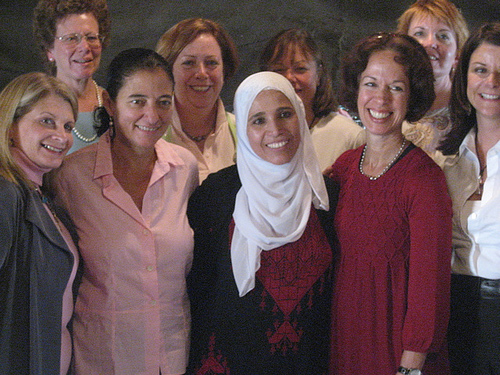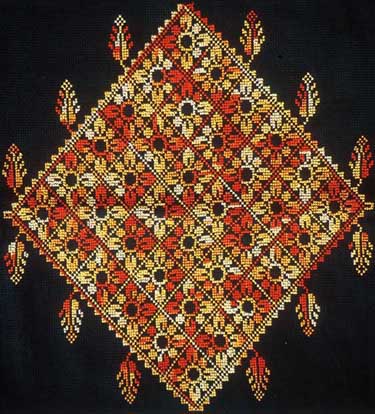
 There used to be a well in the Bedouin village of Lakia, where women would meet to gossip, share wisdom and collect water. They had things to do, they had their old ways of life as women and their families lived off the land, sometimes part of their tribe moving when the seasons changed.
There used to be a well in the Bedouin village of Lakia, where women would meet to gossip, share wisdom and collect water. They had things to do, they had their old ways of life as women and their families lived off the land, sometimes part of their tribe moving when the seasons changed.
Today, except for the unkempt streets, the litter and unused construction supplies that roll around in the abandoned lots, Lakia could look like any other suburban town in the Middle East. But its residents are different: Once nomadic people, the Bedouins in Lakia have settled down to adjust to the new ways of the world. The men no longer go out and graze their animals on the land, but do blue collar work, mainly in factories. The women, for the most part, are not allowed to work.
Instead of living in tents, as they once did not long ago, women in Lakia now live in homes. There is no need to go the well to collect water. They have running water and faucets in their homes. Today, the locked well at the center of Lakia is a symbol of how these women feel, locked out of their evolving culture. They have nothing valuable to do.
The women's skills of embroidery and sewing, collecting water and wood, or setting up the tent at night -- activities that were once the center of the family, are no longer needed. Suffering from high rates of poverty, and abuse: "The women in Lakia no longer go to the well to collect water, but I tell them that the well is inside us," says Naama Elsana, the co-founder of an organization to improve the status of Israeli Bedouin women, to the group.
Elsana and her three Israeli-Bedouin partners envisioned a better life for themselves and founded the Association for the Improvement of Women's Status, Lakia in 1992.
American Women Executives Visit the Bedouin Tent
This past November, Naama and Hessin Elsana, a cofounder of the association, addressed a group of high-powered construction executives from the United States, in Israel at their village. The executives are CEOs and VPs who manage multi-million and billion companies in both America's East and West Coasts, and had come to Israel for one week, on Project Interchange -- seminars which help influential leaders see and experience Israel beyond the conflict, beyond the violence they see on CNN. (see the who's who list at the end of this article).

American women CEOs in the construction business come to Israel on Project Interchange. In this picture they meet Naama Elsana (wearing the head covering), a co-founder of the Association for the Improvement of Women's Status, Lakia.
As part of their week-long journey, the women came to experience an authentic Bedouin village, and meet with Israeli women who were as passionate about women's rights and empowerment as they were. From the posh David Citadel Hotel in Jerusalem, the women boarded the bus to Lakia where they gracefully met by Hessin at the well, and later by Naama at the association's welcome tent, the Yahala Tent.
Profits for a Purpose
Naama who's 40 ("about"), and Hessin, 38, and two other women Amal and Sara all from the Elsana Tribe, welcome groups from all over the world to experience what it's like to be a Bedouin women, with all its uniqueness and hardship.
At their tent in Lakia, they give lectures, answer questions about family life, introduce people to the Bedouin tradition of embroidery, and give them a sample of a Bedouin lunch. It's a pretty massive achievement since only 10 years ago only a handful of Bedouin women in Israel's entire Negev desert went to university. This year there are about 350, most of them enrolled at Ben Gurion University in Beersheba, nearby.
Busloads of people come in to purchase Bedouin embroidery products from the ladies: exotic jewelery, purses, wall hangings, shirts -- all handmade in painstaking detail, with the profits going to a very good purpose. And after the talks, the American women were keen on purchasing authentic Bedouin goods to take back home to their families and friends.

The association gives fulltime work to 70 Bedouin women, and since founding the collective, some four projects have been built to give power back to the Bedouin ladies.
Mobile Library, Kindergartens, and Literacy
They have a desert embroidery project, which trains women who have lost the skill on how to embroider in the old Bedouin tradition. Gifts and products of their handiwork are sold in a nearby shop. The women have built an adult education literacy program, as well as a kindergarten for their children, and a mobile library.
Embroidery is one skill, explain our hosts, that the women can do without leaving the house, and thereby undermining the cultural norms in the traditional Bedouin culture (the men don't want them to leave the house). The small income they make from their work, gives them a sense of independence, and pride.
Traditional embroidery was used for decorating Bedouin dresses, and for teaching kids how to count. The colors and the patterns used to have social significance, giving the age and marital status of the woman wearing the dress. Naama explained to the group that with their work, "slowly, slowly, or shwaya, shwaya," social norms are changing, and Bedouin women are improving their social status in Israel.
Women at the Center
For example, when Naama was a young woman, there was an embroidery pattern used widely by the tribe and taught by its grandmother. One flower in the center represented the village sheik, while the petals on the outside represented the rest of his community.
Today the women of Lakia, she explains, have created their own motif, their own narrative that tells stories through embroidery. The American guests listen on, as they much on homemade rice, hummus, chicken and special Bedouin laffa bread.
Today the women of Lakia have their own pattern: the four women founders are at the center, while the four sheiks of their community are stitched on the outer corners.
The day was finished with some shopping, and by sipping on hot sweet tea. Visitors who can't make it to Israel can do some Fair Trade shopping online. Support the women of Lakia and visit: www.desert-embroidery.org
American women construction executives who came to Israel November 8th to the 15th include: Patricia Lancaster, Former Commissioner, NYC Dept. of Buildings; Emily Ann Youssouf, Former President of the New York City Housing Development Corp; Jane Chmielinski, Group CEO of Corporate Development, AECOM; MaryAnne Gilmartin, Executive Vice President, Forest City Ratner Companies; Deborah Wathen Finn, SVP/Director of Transit and Rail, CH2M Hill; Susan L. Hayes, President & CEO, Cauldwell Wingate; Barbara C. Wagner; Sr. Vice President, Clark Construction; Nicola M. Heryet, Senior Managing Director, Colliers ABR, Inc.; Karen Sweeney, Vice President, General Manager, Turner Construction Company.
Want to Know More About "Green" Bedouin Issues?
Karin Kloosterman is the founder and editor of Green Prophet www.greenprophet.com, the leading environment news site in the Middle East. For tips and inquiries email
